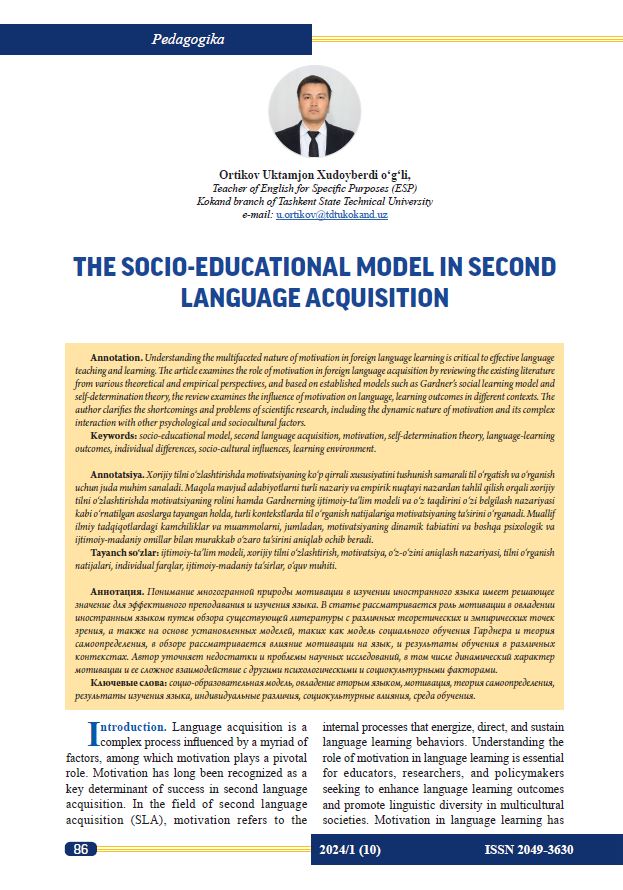Социально-образовательная модель освоения второго языка
DOI:
https://doi.org/10.65185/mojgo.vi.137Аннотация
Понимание многогранной природы мотивации в изучении иностранного языка имеет решающее значение для эффективного преподавания и изучения языка. В статье рассматривается роль мотивации в овладении иностранным языком путем обзора существующей литературы с различных теоретических и эмпирических точек зрения, а также на основе установленных моделей, таких как модель социального обучения Гарднера и теория самоопределения, в обзоре рассматривается влияние мотивации на язык, и результаты обучения в различных контекстах. Автор уточняет недостатки и проблемы научных исследований, в том числе динамический характер мотивации и ее сложное взаимодействие с другими психологическими и социокультурными факторами
Ключевые слова:
cоцио-образовательная модель овладение вторым языком мотивацияБиблиографические ссылки
Gardner R.C. (2001). Integrative motivation and second language acquisition. In Z. Dörnyei & R. Schmidt (Eds.), Motivation and second language acquisition, pp. 1–20.
Eccles J. S., & Wigfield A. (2002). Motivational beliefs, values, and goals. Annual Review of Psychology, 53(1), pp. 109–132.
Noels K.A., Pelletier L.G., Clément R., & Vallerand R.J. (2000). Why are you learning a second language? Motivational orientations and self-determination theory. Language Learning, 50(1), pp. 57–85.
Masgoret A.-M., & Gardner R.C. (2003). Attitudes, motivation, and second language learning: A metaanalysis of studies conducted by Gardner and associates. Language Learning, 53(S1), pp. 167–210.
Dörnyei Z. (2009). The L2 motivational self-system. In Z. Dörnyei & E. Ushioda (Eds.), Motivation, language identity and the L2 self, pp. 9–42.
Komilov J.K., Dehkonov B.A., & Ortikov U.K. (2023). The function of metalanguage in the graphic communication. Oriental renaissance: Innovative, educational, natural and social sciences, 3(4), pp. 622–626.
Tranfield D., Denyer D., & Smart P. (2003). Towards a methodology for developing evidence‐informed management knowledge by means of systematic review. British Journal of Management, 14(3), pp. 207-222.
Ortikov U. (2023). Time allocation for vocabulary training in ESP classrooms. Oriental renaissance: Innovative, educational, natural and social sciences, 3(11), pp. 364–370.
Ortikov U. (2023). Practical uses of corpus analysis in designing language teaching materials. Oriental renaissance: Innovative, educational, natural and social sciences, 3(7), pp. 304–309.

Загрузки
Опубликован
Как цитировать
Лицензия
Copyright (c) 2025 Ortikov Uktamjon Xudoyberdi o‘g‘li

Это произведение доступно по лицензии Creative Commons «Attribution» («Атрибуция») 4.0 Всемирная.









